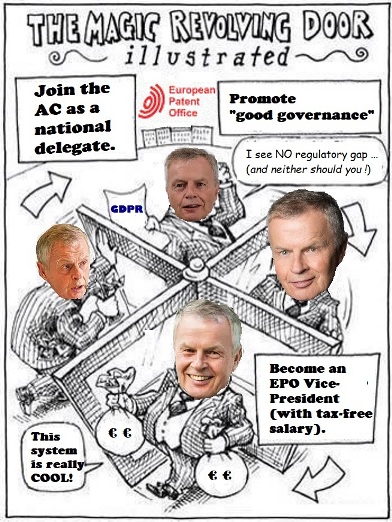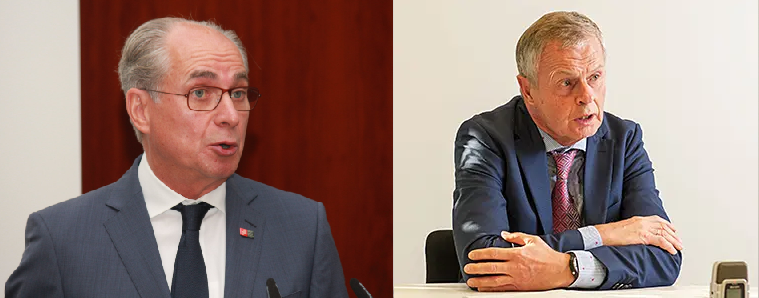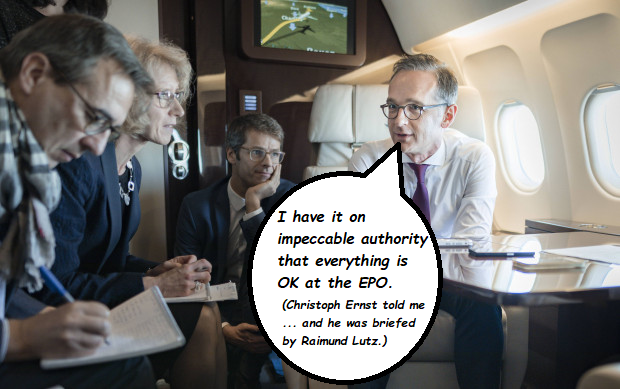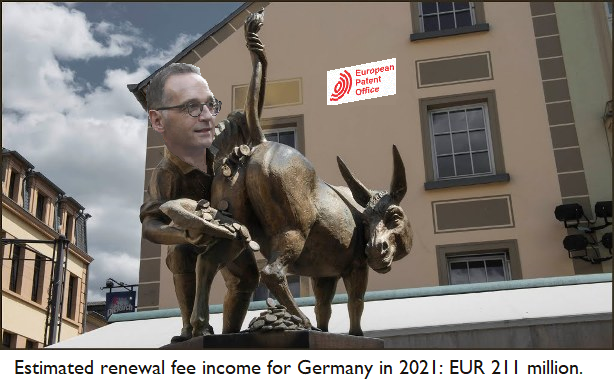

Has the EPO degenerated into a self-service gravy train for those at the top?
In this series we saw how Dr Thomas Petri, the Bavarian State Data Protection Commissioner, and his federal counterpart, Ms Andrea Voßhoff, expressed concerns about serious deficiencies in the EPO's data protection framework in 2014.
"Regrettably, as we have seen, their efforts were frustrated by the intrigues of a Tweedledum-Tweedledee duo, comprising EPO Vice-President Raimund Lutz and Christoph Ernst, an official of the German Justice Ministry who was also the head of the German delegation on the EPO's Administrative Council at the time in question."We also saw how press coverage in June 2015 about the deployment of covert surveillance measures at the EPO by Battistelli's notorious "Investigative Unit" prompted Ms Voßhoff to bring these concerns to the attention of the Legal Affairs Committee of the Bundestag.
These conscientious and public-spirited officials responsible for the monitoring and enforcement of German and EU privacy law did their best to push for a reform of EPO's data protection framework to ensure compliance with contemporary European standards.
Regrettably, as we have seen, their efforts were frustrated by the intrigues of a Tweedledum-Tweedledee duo, comprising EPO Vice-President Raimund Lutz and Christoph Ernst, an official of the German Justice Ministry who was also the head of the German delegation on the EPO's Administrative Council at the time in question.
"The actions of this duo led to a situation in which not only the Federal Government but also the Bundestag and the German public were misled about the true state of affairs at the EPO."The evidence on record suggests that Lutz and Ernst acted in a malfeasant and self-serving manner in order to sabotage the laudable efforts of Dr Petri and Ms Voßhoff to reform the EPO's manifestly deficient data protection framework.

The suspected villains of the piece: Raimund Lutz and his protégé and successor, Christoph Ernst

The EPO echo chamber effect continues to encroach into the domestic political arena in Germany.
"The events which have been covered in this series suggest that this malaise affects not only the European Patent Office as such but also extends to the Administrative Council, which is perceived to exist in an unhealthy and incestuous symbiosis with the senior management of the Office."The only difference to the situation in 2015 is that Christoph Ernst is no longer at the German Ministry of Justice but is now sitting at the helm of the EPO's Directorate of Legal and International Affairs as the successor of his mentor, Raimund Lutz.
It has been claimed by critics of the EPO - both inside and outside - that systematic abuses of the organisation's immunity and autonomous legal status - which reached unprecedented levels during the Battistelli era - have caused this once proud "model international organisation" to degenerate into a rather grubby little self-service gravy train for those at the top.
The events which have been covered in this series suggest that this malaise affects not only the European Patent Office as such but also extends to the Administrative Council, which is perceived to exist in an unhealthy and incestuous symbiosis with the senior management of the Office.
Over the last decade or so the Council - which is supposed to act as the governing and supervisory body of the organisation - has come to operate more and more as a self-serving clique of national civil servants whose activities are only nominally subject to ministerial oversight.
Indeed, if the German example covered in this series is anything to go by, some of the Council delegates seem to have become adept at pulling the wool over the eyes of their supervising Ministers.
It is important to note that the Administrative Council's exercise of its supervisory role is seriously compromised by the fact that the Council stands in a relationship of "absentee ownership" to the European Patent Office (to borrow a phrase from the American economist and sociologist, Thorsten Veblen).
Thus, the national IP Offices represented on the Council reap the rewards of the EPO's work - to the estimated tune of a grand total of EUR 611 million in 2021.
At the same time, in their capacity as "absentee owners" whose personal fiefdoms - i.e. the national IP Offices - benefit in an effortless manner from this arrangement, the Council delegates bear no apparent liability for the decisions that they take - or fail to take - in their capacity as members of the supervisory organ of the EPO.
Indeed, in recent years the impression has been given that this closed circle of "absentee owners" became so preoccupied with divvying up the spoils which can be extracted from the EPO that they completely lost sight of the need to pay attention to the proper governance of the organisation.

The political masters of the EPO - both in Germany and throughout the contracting states - appear to be primarily concerned with maintaining and increasing the lucrative cash flow from the "Dukatenesel".
"In addition to this, a whole host of matters of vital importance from the perspective of "good governance" have been ignored or dismissed as irrelevant over the past decade."However, the obsessive fixation on the "bottom line" and the misguided pursuit of "profit maximisation" at all costs have produced highly deleterious effects on the overall well-being of the organisation.
In addition to this, a whole host of matters of vital importance from the perspective of "good governance" have been ignored or dismissed as irrelevant over the past decade.
Such matters include compliance with data protection and other generally recognised legal standards and the provision of a properly functioning internal justice system to protect staff from the excesses and abuses of a cynical and tyrannical management.
Beneficiaries of the current system like Lutz and Ernst try to justify this patently unsatisfactory state of affairs by pontificating about the right of the EPO "to make its own internal law independent of and deviating from the law of the contracting states and the EU".
But in propagating their perverse apologetics for the Council's failures, these virtuosos of legal sophistry ignore the fact that the EPO's autonomous legal status does not absolve the members of the Administrative Council from observing and respecting internationally recognised legal principles and standards, including those relating to data protection.
All of the EPO's contracting states are members of the Council of Europe and they have all subscribed to the principles of data protection adopted and endorsed by that body.
The European Patent Organisation should not be permitted to arbitrarily deviate from these principles on the basis of dubious legal sophistry promulgated by certain individuals in pursuit of their own hidden agendas and personal ambitions.
"In the year in which the Council of Europe and its member states commemorate the 40th anniversary of Convention 108, there really is no excuse for the shameful failure of the EPO's Administrative Council to provide the organisation which it purports to govern with a fully GDPR-compliant data protection framework."In conclusion, it is worth recalling that Convention 108 which laid the foundation of contemporary European data protection law was opened for signature by the Council of Europe on 28 January 1981, which is celebrated as European Data Protection Day.
In the year in which the Council of Europe and its member states commemorate the 40th anniversary of Convention 108, there really is no excuse for the shameful failure of the EPO's Administrative Council to provide the organisation which it purports to govern with a fully GDPR-compliant data protection framework.
"As long as the contracting states continue “duck away” from their international obligations in this regard (to borrow a phrase from Heiko Maas), it would be naïvely optimistic to expect that any effective action will be taken to remedy the problems which have been identified in the present series."Unfortunately, there is at present no sign of the political will which would be required to rectify the situation - neither inside the EPO's Administrative Council nor at a ministerial level in the contracting states, which - under the terms of the EPC - remain the ultimate guarantors of the proper functioning of the organisation and its compliance with the rule of law.
As long as the contracting states continue "duck away" from their international obligations in this regard (to borrow a phrase from Heiko Maas), it would be naïvely optimistic to expect that any effective action will be taken to remedy the problems which have been identified in the present series. ⬆